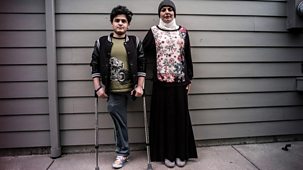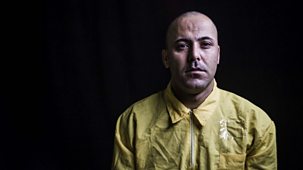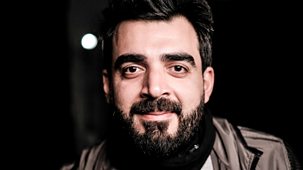
Series 1: 3. Fallujah
At the start of the Iraq War in 2003, over 600 journalists and photographers are given permission by the US government to follow the war as embedded reporters. Dexter Filkins and photographer Ashley Gilbertson are working for the New York Times when they enter Fallujah with Bravo Company in November 2004.\n\nIt is the most intense battle of the entire war and the biggest the marines have fought since Vietnam. For the duration of the battle, both journalists live with the marines, filing their stories as they are constantly shot at. Illustrated by thousands of photographs taken by Gilbertson that week, many of them never before published, as well as unseen material taken by the marines themselves, this film takes viewers into the heart of the battle. Gilbertson’s decision to capture an image of an Iraqi sniper shooting from inside a minaret changes not only his life but the lives of the soldiers with him.\n\nNidhal Abed has lived in Fallujah her entire life. On 4 November 2004, her two-year-old son Mustafa is running a high fever. She leaves her home to take Mustafa to the doctors just a few streets away. What happens next ensures their lives are also never the same again.\n\nWith unique archive of the battle itself, this story is told through the marines, journalists and residents of Fallujah.
Source: BBC 4
Most recent episodes of Once Upon a Time in Iraq
Once Upon A Time In Iraq
Series 1: 5. Legacy
In 2004, Waleed Nesyif, heavy metal musician, is forced to flee Iraq following death threats for working for American journalists as a translator. By the time America finally wi ...
27-10-2021
BBC 4
Once Upon A Time In Iraq
Series 1: 4. Saddam
When Saddam Hussein is captured by coalition forces in December 2003, politicians in the White House believe this will be the turning point they need to bring democracy to Iraq. ...
27-10-2021
BBC 4
Once Upon A Time In Iraq
Series 1: 3. Fallujah
At the start of the Iraq War in 2003, over 600 journalists and photographers are given permission by the US government to follow the war as embedded reporters. Dexter Filkins an ...
26-10-2021
BBC 4
Once Upon A Time In Iraq
Series 1: 2. Insurgency
When Lieutenant Colonel Nate Sassaman arrived in Iraq in 2003, his belief in the task ahead - of delivering democracy and stability to the Iraqi people - was unquestioning. Sass ...
25-10-2021
BBC 4
Once Upon A Time In Iraq
Series 1: 1. War
Waleed Nesyif was 18 when George Bush gave Saddam Hussein just 48 hours to leave Iraq. He was, like many Iraqi teenagers at that time, infatuated by the West. But while many of ...
25-10-2021
BBC 4
Most popular episodes of Once Upon a Time in Iraq
Once Upon A Time In Iraq
Series 1: 4. Saddam
When Saddam Hussein is captured by coalition forces in December 2003, politicians in the White House believe this will be the turning point they need to bring democracy to Iraq. ...
27-10-2021
BBC 4
Once Upon A Time In Iraq
Series 1: 2. Insurgency
When Lieutenant Colonel Nate Sassaman arrived in Iraq in 2003, his belief in the task ahead - of delivering democracy and stability to the Iraqi people - was unquestioning. Sass ...
25-10-2021
BBC 4
Once Upon A Time In Iraq
Series 1: 5. Legacy
In 2004, Waleed Nesyif, heavy metal musician, is forced to flee Iraq following death threats for working for American journalists as a translator. By the time America finally wi ...
27-10-2021
BBC 4
Once Upon A Time In Iraq
Series 1: 1. War
Waleed Nesyif was 18 when George Bush gave Saddam Hussein just 48 hours to leave Iraq. He was, like many Iraqi teenagers at that time, infatuated by the West. But while many of ...
25-10-2021
BBC 4
Once Upon A Time In Iraq
Series 1: 3. Fallujah
At the start of the Iraq War in 2003, over 600 journalists and photographers are given permission by the US government to follow the war as embedded reporters. Dexter Filkins an ...
26-10-2021
BBC 4





